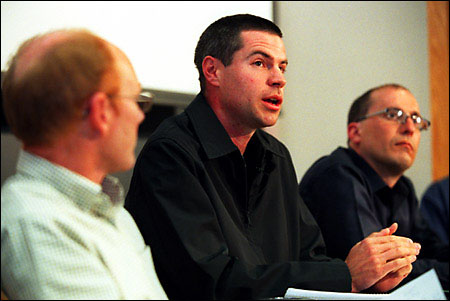Is environmentalism dead?
(Authors call for new post-environmentalism)

Authors of a controversial paper calling for the death of modern environmentalism to make way for a movement better able to handle the dramatic, global problems facing the world defended their ideas Tuesday (May 3) in an event at the John F. Kennedy School of Government.
Michael Shellenberger and Ted Nordhaus, whose article “The Death of Environmentalism” has sparked widespread discussion about the successes, failures, and future of the environmental movement in the United States, spoke to a crowded Starr Auditorium in the Kennedy School’s Belfer Center. The article was released at the October 2004 meeting of the Environmental Grantmakers Association.
Shellenberger introduced their thoughts on the subject, saying that despite the dramatic successes of the environmental movement over the years with pollution clean-up and endangered species protection, today’s problems are intrinsically different from those faced in the past.
Shellenberger described the 1969 Cuyahoga River fire and the dangers of urban smog as dramatic but relatively simple problems that could be addressed in a straightforward fashion through government regulation.
Today’s issues of global warming, species extinction, habitat destruction, and degradation of the oceans are different, he said, because they will require a complete overhaul of how we generate and consume energy and a re-examining of humankind’s relationship with the natural world.
The failures of the environmental movement to make significant progress in recent decades shows they’re not up to the task, he said.
Polls show broad support for environmental values among Americans, but that support is very shallow, Shellenberger said. That is illustrated by the fact that all three branches of U.S. government are dominated by those hostile to environmental causes and by environmental failures in recent years. He cited as examples the failure to act on global warming and 25 years of no progress on improving automobile fuel efficiency, despite enormous advances in automobile technology.
Today’s challenges require a departure from the narrow focus of most environmental groups to the development of a broader vision that puts protection of the environment within a context of other issues, such as jobs and the economy, and that begins to build a coalition around a vision that binds them all together.
“Environmentalists have spent the last 40 years giving the ‘I Have a Nightmare’ speech – telling people to eat their peas, eat their spinach, without tapping into hopes and aspirations,” Shellenberger said. “We think that progressives and environmentalists have a lot to learn from conservative successes over the years.”
Shellenberger’s remarks drew a variety of responses, with several criticizing his and Nordhaus’ position as minimizing the importance of a wide variety of environmental programs that are doing successful work, such as protecting important habitat and restoring rivers.
Kennedy School student Graham Bullock said he disagreed that environmentalism is dead but agreed that a new vision is needed. Cultures around the world, he said, view nature as sacred and special, but that view doesn’t translate into action.
Assistant Professor Judith Layzer of the Massachusetts Institute of Technology’s Department of Urban Studies and Planning moderated the event. Layzer said she thought that Shellenberger and Nordhaus ought to have offered prescriptions for future action and proposed four core values around which environmental and other progressive issues can unify.
The values are interdependence, humility, caution, and the belief that government’s role is to be the major actor in situations where individual action is neither possible nor sufficient.
Nordhaus responded to the critiques, saying that he and Shellenberger intentionally didn’t offer possible solutions because they felt that a new vision had to emerge from a broader discussion of the issues. He said they termed it the “death” of environmentalism, because they believe just repackaging current efforts won’t be enough to address the problem.
“When you look at the environmental movement, at the great ecological challenges that the planet is faced with, that humanity is faced with, environmentalism has proven utterly incapable of addressing them,” Nordhaus said. “The reason we called for environmentalism’s death is so that we could call for a new movement that can address these challenges.”




